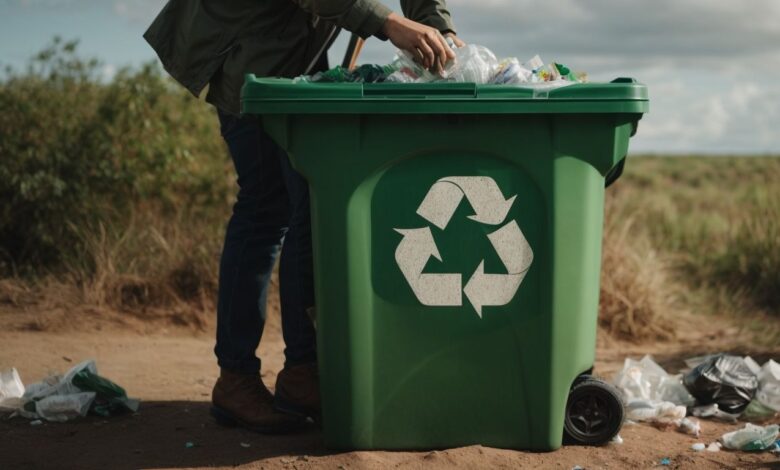Eco-Friendly Junk Removal: Responsible Disposal and Recycling Tips

In today’s world, environmental responsibility is more important than ever. As we become more aware of the impact our actions have on the planet, many of us are looking for ways to minimize waste, reduce pollution, and practice sustainability. One area that often goes overlooked is junk removal. Clearing out unwanted items doesn’t have to mean contributing to landfills. In fact, with a bit of effort and planning, it’s possible to manage household junk and trash in a way that’s eco-friendly and beneficial to the environment.
In this article, we’ll explore the concept of eco-friendly junk removal, offering practical tips for responsibly disposing of your junk while minimizing your environmental footprint.
1. The Environmental Impact of Junk: Why Responsible Disposal Matters
When it comes to getting rid of household items, many people don’t think twice about tossing them into the trash. However, improperly disposing of junk can have long-lasting environmental consequences. Landfills are overflowing with items that could have been recycled, and many materials take decades—or even centuries—to decompose. Hazardous materials like old electronics or chemicals can leak toxins into the soil and water, affecting local ecosystems and public health.
This is why responsible disposal is crucial. By taking the time to sort through your junk and making informed decisions about what to do with each item, you can help reduce the amount of waste that ends up in landfills and minimize the harmful effects on the environment.
Reducing Landfill Waste
One of the biggest environmental issues caused by junk disposal is the overuse of landfills. When non-biodegradable materials like plastic, metal, and electronics are thrown away, they take up space in landfills for years, slowly breaking down and releasing harmful chemicals into the air and soil.
By practicing responsible junk removal, you can make sure that as little waste as possible ends up in landfills. This means separating out items that can be recycled, repurposed, or donated and properly disposing of hazardous materials.
The Problem with E-Waste
E-waste, or electronic waste, is one of the fastest-growing categories of waste in the world. Old computers, phones, and other electronics often contain toxic materials like lead, mercury, and cadmium. When these items are discarded improperly, these toxins can leach into the soil and contaminate nearby water sources. Recycling e-waste is not only important for keeping harmful chemicals out of the environment but also for recovering valuable materials like metals and plastics that can be reused.
2. Recycling: The Key to Sustainable Junk Removal
Recycling is one of the most effective ways to reduce the environmental impact of junk removal. Many items commonly found in homes can be recycled rather than thrown away, reducing the need for new raw materials and cutting down on landfill waste. The goal of eco-friendly junk hauling is to divert as much waste as possible from the landfill by identifying recyclable materials and ensuring they are processed properly.
What Can Be Recycled?
Here’s a quick breakdown of the types of items that are commonly recyclable:
- Plastics: Containers, bottles, and plastic packaging are often recyclable, though it’s important to check the recycling codes in your local area.
- Metals: Items made of aluminum, steel, or copper—such as old appliances, metal furniture, and tools—can be recycled to recover valuable resources.
- Glass: Most types of glass, including jars, bottles, and windows, can be recycled.
- Paper and Cardboard: Old documents, newspapers, and cardboard boxes can be recycled to make new paper products.
- Electronics: Many electronics contain valuable materials that can be recovered and reused. It’s essential to recycle electronics at a proper facility to avoid e-waste contamination.
It’s also important to understand that some items may require special handling. For instance, batteries, light bulbs, and certain types of electronics often require specific disposal methods to ensure they don’t release harmful chemicals.
How to Recycle Junk Responsibly
The first step in responsible recycling is sorting through your items and identifying what can be recycled. You can set up separate bins or piles for plastics, metals, glass, and paper, ensuring that everything is organized for proper disposal.
When working with a professional junk removal service like Junk B Gone, they’ll often handle the recycling process for you. This is a great way to ensure that everything is disposed of responsibly without having to do the work yourself. Many junk removal companies are committed to eco-friendly practices, sorting through your junk to recycle as much as possible.
3. Donating and Repurposing: Giving Your Junk a Second Life
Not all junk is destined for the landfill—or even for the recycling bin. Many items that you no longer need may still be usable and can be donated or repurposed. This is especially true for furniture, appliances, clothing, and other household goods that are in good condition.
The Benefits of Donating
Donating items that are still in usable condition is one of the best ways to reduce waste. Many charities, shelters, and non-profit organizations accept gently used items, helping people in need while keeping perfectly good products out of the trash.
Here are a few types of items you can consider donating:
- Furniture: Old couches, tables, and chairs that are still in good condition can be donated to charities or shelters. Many organizations will even pick up large items, making the donation process hassle-free.
- Clothing: If you’re clearing out your closet, consider donating gently used clothing to local shelters or clothing drives.
- Appliances: Old refrigerators, microwaves, and other appliances can be donated if they’re still functioning.
- Toys and Games: Children’s toys, board games, and books are often appreciated by schools or community centers.
Many junk removal services, including Junk B Gone, work with local charities to ensure that usable items are donated rather than discarded. This helps reduce waste while supporting community organizations.
Repurposing and Upcycling
In addition to donating, some items can be repurposed or upcycled into new creations. For example, old wooden furniture can be refinished or painted to give it a new life, while glass jars can be repurposed into storage containers or decorative pieces. Upcycling is a fun and creative way to reduce waste and keep items out of the landfill while adding a unique touch to your home.
4. Handling Hazardous Materials: Safe and Eco-Friendly Disposal
Certain items in your home may be considered hazardous and require special disposal methods. These include things like batteries, old paint, chemicals, and electronics. Improperly disposing of hazardous materials can harm the environment and pose health risks, so it’s important to handle them carefully.
Common Household Hazardous Waste
Here’s a list of common household hazardous materials that require special disposal:
- Batteries: Both single-use and rechargeable batteries contain chemicals that can be harmful if not disposed of properly. Many recycling centers accept batteries, or you can take them to designated drop-off locations.
- Paint and Chemicals: Leftover paint, solvents, and cleaning products should never be poured down the drain or thrown in the trash. These items can be taken to hazardous waste facilities for safe disposal.
- Light Bulbs: Compact fluorescent lamps (CFLs) and other types of light bulbs often contain small amounts of mercury, which is toxic. It’s important to recycle these bulbs at the appropriate facilities.
Hiring a professional junk removal company ensures that hazardous materials are disposed of safely and in compliance with local regulations. Junk removal specialists are trained to handle these items and can ensure they don’t end up in landfills or waterways.
5. Working with Eco-Conscious Junk Removal Services
If you’re committed to minimizing your environmental footprint, working with an eco-conscious junk removal service is the best way to ensure that your unwanted items are disposed of responsibly. Look for companies that prioritize recycling, donating, and proper waste disposal.
Junk B Gone in Seattle is one such company that offers junk removal services with a focus on sustainability. By choosing an environmentally friendly junk hauling service, you can rest assured that your junk is being handled in a way that protects the planet.
Conclusion: Making Junk Removal Eco-Friendly
By adopting an eco-friendly approach to junk removal, you can make a positive impact on the environment while decluttering your home. From recycling and donating to handling hazardous materials responsibly, there are many ways to reduce your waste and practice sustainability.
For homeowners looking to remove junk without harming the environment, services like Junk B Gone provide a practical and eco-conscious solution. Whether you’re dealing with everyday household junk and trash or clearing out old appliances, choosing a green junk removal option helps you do your part for the planet.



